2018年镇江高中英语优质课评比获奖情况公示
镇江市第二十二次优秀教育科研论文评选结果(直属)
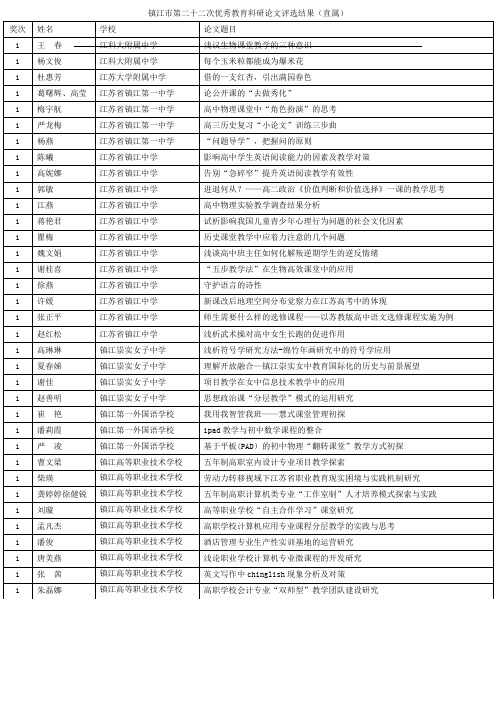
2
肖雪
镇江第一外国语学校
给学生一个梯子
2
朱晶晶
镇江第一外国语学校
初探思维导图在化学教学中的应用
2
龚华刚
镇江高等职业技术学校
基于“双元制”模式的高职商务英语专业课程设置研究
2
黄小红
镇江高等职业技术学校
基于案例和规则的混合推理技术在产品概念设计中的应用
2
蒋丽仙
镇江高等职业技术学校
教师先行,提高效率
2
石萍
镇江市实验初中
初中英语校本阅读课程的开发与实施研究
2
汤英
镇江市实验初中
从命名和评价着手加强小组文化建设
2
唐云
镇江市实验初中
扬长避短,让小组合作练习的效能最大化
2
田启美
镇江市实验初中
《对初中学生合作能力的培养课题》阶段性研究报告
2
王增强
镇江市实验初中
浅谈物理实验设计和实施时的关注点
2
唐菊红
江科大附属中学
每天锻炼一小时,幸福生活一辈子
2
王璐璐
江科大附属中学
课堂中养成良好的音乐学习习惯
2
杜惠芳
江苏大学附属中学
蜕变 成长——浅谈教育博客助我成长
2
蒋俊
江苏大学附属中学
对我校教师“亚健康”状况的诊断归因及预防对策
2
王伟微
江苏大学附属中学
“启发性提示语”在数学课堂探究中的应用
2
吴涛
江苏大学附属中学
“创造、发现、探究”的校本科学活动课程构建
1
韦竟
镇江市外国语学校
针对青少年足球运动训练的基本方法
2
我市高中英语教师在省优质课展评中喜获佳绩
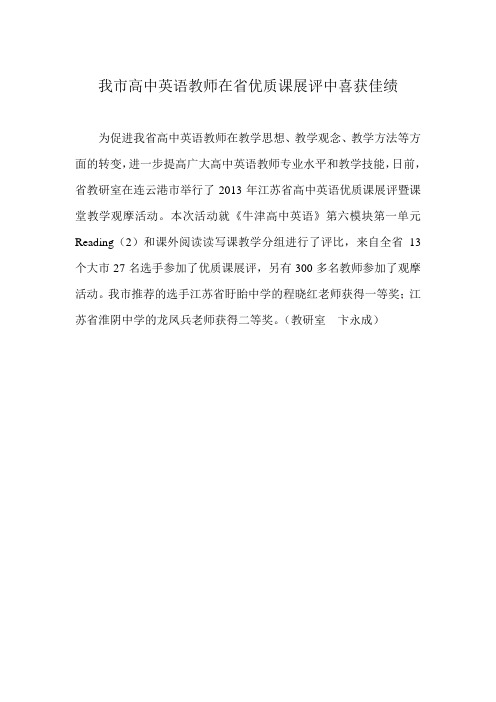
我市高中英语教师在省优质课展评中喜获佳绩
为促进我省高中英语教师在教学思想、教学观念、教学方法等方面的转变,进一步提高广大高中英语教师专业水平和教学技能,日前,省教研室在连云港市举行了2013年江苏省高中英语优质课展评暨课堂教学观摩活动。
本次活动就《牛津高中英语》第六模块第一单元Reading(2)和课外阅读读写课教学分组进行了评比,来自全省13个大市27名选手参加了优质课展评,另有300多名教师参加了观摩活动。
我市推荐的选手江苏省盱眙中学的程晓红老师获得一等奖;江苏省淮阴中学的龙凤兵老师获得二等奖。
(教研室卞永成)。
镇江市第六届教育科研优秀案例评选获奖名单(京口)
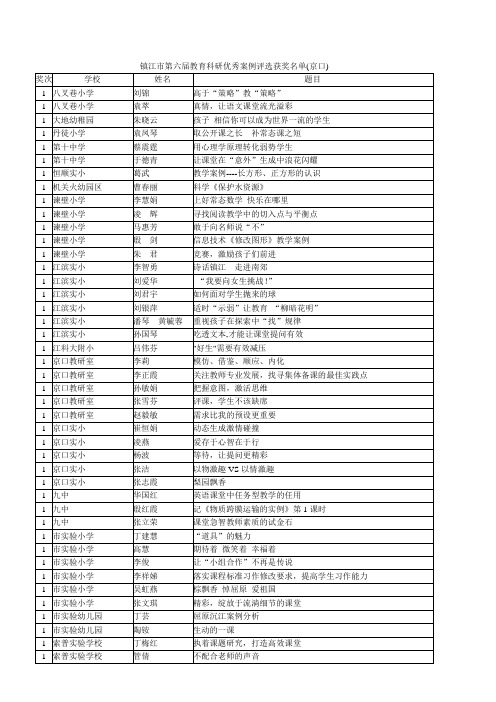
红旗小学
万巧英
《天游峰的扫路人》教学案例
3
红旗小学
熊建琳
《学棋》案例
3
红旗小学
许棠
男生不“难”
3
红旗小学
许丹茜
师生互动,促使学生平等意识下的主动学习
3
红旗小学
朱晓俊
寻找人类的“老师”——语文实践活动课教学案例
3
红旗小学
祝一玲
牛津小学英语6A Unit 2 Ben's birthday
3
佳佳幼稚园
江双娇
2
桃花坞小学
徐薇
牛津小学英语3B Unit3 Family members案例分析
2
桃花坞小学
朱雪梅
标准与随机的碰撞
2
桃花坞小学
祝俊
激发学生潜能生成灵动课堂
2
桃花坞幼儿园
杨玥
让孩子自信地飞翔
2
桃花坞幼儿园
张慧
欣赏的美
2
五条街小学
杜楠
着力突破小学英语语篇教语歌曲的魅力
2
五条街小学
2
索普实验学校
周丽梅
非预设生成同样精彩——《分数的大小比较》
2
索普实验学校
朱晨
8B Unit 5 Welcome to the Unit教学案例
2
桃花坞小学
陈明媚
为快乐买单
2
桃花坞小学
崔亮
孩子,你怎么了?
2
桃花坞小学
范跃斌
婴其呜矣,求其友声
2
桃花坞小学
侯静
让我们和动物做朋友吧
2
桃花坞小学
蒋燕
巧为孩子来减负
1
恒顺实小
江苏省苏州无锡常州镇江四市2018届高三教学情况调研(一)英语试题含答案
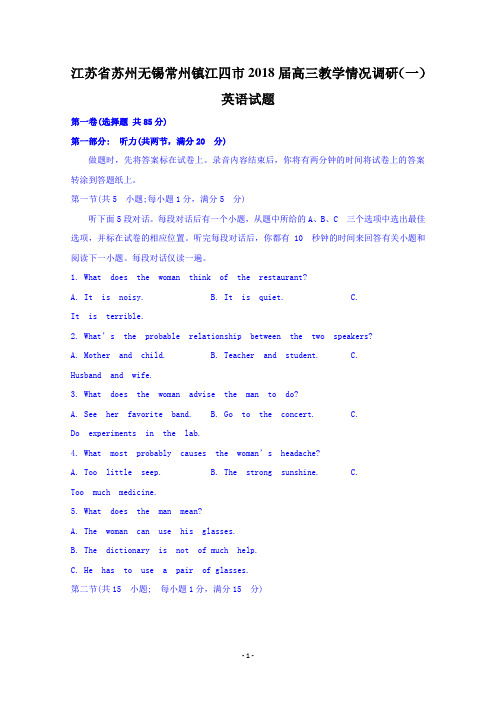
江苏省苏州无锡常州镇江四市2018届高三教学情况调研(一)英语试题第一卷(选择题共85分)第一部分: 听力(共两节,满分20 分)做题时,先将答案标在试卷上。
录音内容结束后,你将有两分钟的时间将试卷上的答案转涂到答题纸上。
第一节(共5 小题;每小题1分,满分5 分)听下面5段对话。
每段对话后有一个小题,从题中所给的A、B、C 三个选项中选出最佳选项,并标在试卷的相应位置。
听完每段对话后,你都有10 秒钟的时间来回答有关小题和阅读下一小题。
每段对话仅读一遍。
1. What does the woman think of the restaurant?A. It is noisy.B. It is quiet.C.It is terrible.2. What’s the probable relationship between the two speakers?A. Mother and child.B. Teacher and student.C.Husband and wife.3. What does the woman advise the man to do?A. See her favorite band.B. Go to the concert.C.Do experiments in the lab.4. What most probably causes the woman’s headache?A. Too little seep.B. The strong sunshine.C.Too much medicine.5. What does the man mean?A. The woman can use his glasses.B. The dictionary is not of much help.C. He has to use a pair of glasses.第二节(共15 小题; 每小题1分,满分15 分)听下面5 段对话或独白。
2017-2018学年江苏省镇江市高二第二学期期末英语试题(Word版)
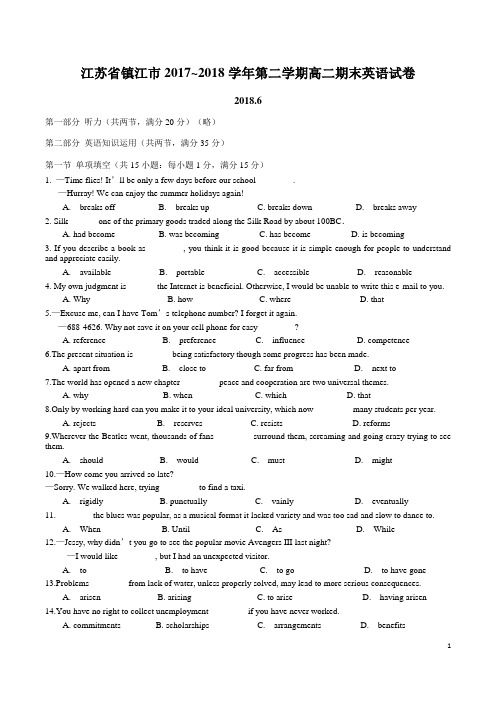
江苏省镇江市2017~2018学年第二学期高二期末英语试卷2018.6第一部分听力(共两节,满分20分)(略)第二部分英语知识运用(共两节,满分35分)第一节单项填空(共15小题:每小题1分,满分15分)1. —Time flies! It’ll be only a few days before our school ________.—Hurray! We can enjoy the summer holidays again!A. breaks offB. breaks upC. breaks downD. breaks away2. Silk ______ one of the primary goods traded along the Silk Road by about 100BC.A. had becomeB. was becomingC. has becomeD. is becoming3. If you describe a book as ________, you think it is good because it is simple enough for people to understand and appreciate easily.A. availableB. portableC. accessibleD. reasonable4. My own judgment is ______ the Internet is beneficial. Otherwise, I would be unable to write this e-mail to you.A. WhyB. howC. whereD. that5.—Excuse me, can I have Tom’s telephone number? I forget it again.—688-4626. Why not save it on your cell phone for easy ________?A. referenceB. preferenceC. influenceD. competence6.The present situation is ________ being satisfactory though some progress has been made.A. apart fromB. close toC. far fromD. next to7.The world has opened a new chapter ________ peace and cooperation are two universal themes.A. whyB. whenC. whichD. that8.Only by working hard can you make it to your ideal university, which now ________ many students per year.A. rejectsB. reservesC. resistsD. reforms9.Wherever the Beatles went, thousands of fans ________ surround them, screaming and going crazy trying to see them.A. shouldB. wouldC. mustD. might10.—How come you arrived so late?—Sorry. We walked here, trying ________ to find a taxi.A. rigidlyB. punctuallyC. vainlyD. eventually11.________ the blues was popular, as a musical format it lacked variety and was too sad and slow to dance to.A. WhenB. UntilC. AsD. While12.—Jessy, why didn’t you go to see the popular movie Avengers III last night?—I would like ________, but I had an unexpected visitor.A. toB. to haveC. to goD. to have gone13.Problems ________ from lack of water, unless properly solved, may lead to more serious consequences.A. arisenB. arisingC. to ariseD. having arisen14.You have no right to collect unemployment ________ if you have never worked.A. commitmentsB. scholarshipsC. arrangementsD. benefits15.—I went up to speak to him, but he turned away and left.—Why did he give you ________? You are good friends, aren’t you?A. a wet blanketB. a cup of teaC. the cold shoulderD. a tough nut第二节完形填空(共20小题:每小题1分,满分20分)We were going to be late.My kids were dawdling (磨蹭), (1) I’d asked them to get ready on two occasions. “Come on!” I (2) “How many times do I have to say this?”As they (3) their pace and came down the stairs, my kids both gave me a “look.”“Geez, Dad, you don't have to yell,” my son told me.My dark side had a number of (4) to this comment. All of them (5) my yelling and placed the blame on my kids. And I thought my kids were all (6) . My ego (自尊) badly wanted to be (7) from taking responsibility for this outburst. After all, I was the one who would take the duty for being (8) . I was the one trying to move things along. And they were the ones who weren’t (9) me, right?Suddenly, I (10) a psychologist’s warning: outbursts of (11) from fathers are one of the main reasons kids don’t feel like giving voice to you. And besides, they are frightening, and (12) relationships with your kids.When I yelled at my kids, I had (13) the warning. Now I was still able to put some (14) on them. Part of me was still (15) that they “caused” my anger.But as we drove off in the car, things became clearer. I said “sorry” to them. My (16) helped me feel better, and my kids were (17) to forgive. Of course, I gave up the right to feel (18) for my anger. I guess I’d like my kids to feel like they (19) expressing themselves to me.And I guess I’d like that even more than being “ (20) ”.(1) A. as if B. so that C. even though D. in case(2) A. chatted B. yelled C. smiled D. whispered(3) A. stepped back B. gave up C. picked up D. called for(4) A. responses B. conclusions C. solutions D. approaches(5) A. resisted B. defended C. avoided D. repeated(6) A. young B. innocent C. cruel D. wrong(7) A. protected B. blocked C. separated D. stopped(8) A. free B. busy C. late D. crowded(9) A. adoring B. accepting C. respecting D. following(10) A. shared B. remembered C. forgot D. explained(11) A. anger B. affection C. anxiety D. distrust(12) A. shaping B. damaging C. promoting D. repairing(13) A. recalled B. balanced C. ignored D. declined(14) A. hope B. hatred C. demand D. blame(15) A. convinced B. informed C. reminded D. ensured(16) A. silence B. apology C. scold D. status(17) A. tired B. quick C. afraid D. unwise(18) A. accessible B. responsible C. comfortable D. reasonable(19) A. risk B. forgive C. deserve D. hate(20) A. right B. kind C. clever D. angry第三部分阅读理解(共15小题:每小题2分,满分30分)AThe Ritz-Carlton has joined hands with Mizu Botanical Laboratory, a local flower shop, to launch a new afternoon tea in early April.Running until April 30, the two sides have come together to provide guests with a unique afternoon tea experience of cakes, sandwiches and tea combined with a flower arranging lesson.Mizu Botanical Laboratory, founded in 2015, specializes in floral (花的) design and arranging.“We hope to promote plants to people from all walks of life,”said Ma Tiantian, a founder of the shop.”That includes those that like having afternoon tea at a hotel.”Ma added that the Ritz-Carlton was looking for a new and unique theme to go along with its afternoon tea. “We use our plants to inspire their dessert chef and offer floral inspired courses for the guests,”she said.Tang Shushu, director of public relations at the hotel, said: “Our hotel serves ladies and gentlemen in an elegant style. We create differently themed afternoon teas every month by searching for and matching elements.”“Mizu is a unique partner for us,”said Tang, adding the flower specialists combine natural beauty with scientific elements for people to experience, which is perfect for spring.Apart from the flower arranging workshops, the afternoon tea will feature imported coffee, and delicate sweets and savories such as flower and jelly cheesecake, red berry trifles, white chocolate citrus tart, and brioche with egg salad and black truffle.There are two options (选择) for the afternoon tea. One is priced at 477 yuan ($80) for two people, and comes with two complimentary (免费赠送的) fragrance essential oil cards. The other is priced at 588 yuan for one person, and includes the workshops which run from 2 pm to 5 pm on April 21 and 22.(1) We can learn from the passage that the Ritz-Carlton ________.A. runs from 2 pm to 5 pmB. is a local flower shopC. was founded in 2015D. serves afternoon teas with differentthemes(2) The passage is intended to introduce ________.A. an afternoon tea at the Ritz-CarltonB. flower design and arrangingworkshopsC. two options of different pricesD. Mizu Botanical LaboratoryBPurpose is a universal human need.A recent study draws a strong relationship between purposefulness and happiness. Purpose seems beneficial to overcoming substance (物质) abuse, healing from tragedy and loss, and achieving economic success. Businesses and organizations seek to achieve goals as ways to unify employees and customers under the banners of brand strategy, community, and well-being.But, where does purpose come from? What is it? For over two millenniums, identifying our purpose in the universe has been a major task of philosophers.Aristotle believed that the universe is full of it, and that everything has an inborn drive. Our word purpose comes from the Greek telos, a goal telling us what and how something needs to be. For Aristotle, the universe and everything in it has an essential directive—each thing has a principle that guides the course of its existence.What about human beings? Aristotle tells us that our purpose is happiness or eudaemonia,“well-spiritedness.”Happiness is an ordered life. Good habits and a sound mind are some of the steps that lead us there. For Aristotle, nothing is more important for us.In many ways, we still think like Aristotle. Most people strives for happiness. Whether you’re planning a major life change or healing from harm, being told that there’s no purpose in life might be particularly destructive. The chances are better that you’re looking for a final explanation.What’s the purpose in that, though? There isn’t one, at least not basically. But the universe as we understand it tells us nothing about the goal or meaning of existence, let alone our own. In the grand scheme (组合、系统) of things, you and I are unimportant.But not entirely unimportant. For starters, we are important to each other. Meaning begins and ends with how we talk about our own lives, such as our myths and stories. Sean Carroll, a theoretical physicist at the CIT, argues that meaning and purpose arise as ways of talking about our human-scale environment. Even materialists can’t deny the fact that purposes somehow exist to give us meaning and happiness.Purpose springs from our longing for permanence (永久) in an ever-changing universe. It is a reaction to the universe’s indifference (漠不关心) to us. Stories pass through generations, often becoming traditions, customs, even laws and institutions that order and give meaning to our lives. Purpose grows out of the durability (耐久性) of human traditional knowledge. Our stories serve as directives for the ways we need the world to exist.Purpose is about loss, or at least the prevention of it. And there’s nothing wrong with that. We create purposes to establish happy endings in a universe where endings are simply that—endings.So, take a moment to think about the stories informing your purpose. I’ll reflect on mine, too. The universe, however, won’t. And that might be the most meaningful distinction of all.(1) The following statements are true EXCEPT that ________.A. Aristotle believed that the universe is filled with purposeB. a strong link exists between purposefulness and happinessC. a major task for philosophers is to identify our purpose in the universeD. human beings are extremely important in the grand scheme of things(2) What is human beings’purpose according to the passage?A. Loss.B. Existence.C. Happiness.D. Success.(3) If we want to be happy, what should we do?A. Look for a final explanation.B. Develop good habits and a sound mind.C. Overcome substance abuse, heal from tragedy and loss and get success.D. Seek to achieve goals to unify under the banners of brand strategy, community, and well-being.(4) What might be the best title for the text?A. The universe is full of purposeB. The word purpose comes from GreeceC. The universe doesn’t care about your “purpose”D. Think about the stories informing your purposeCPop singers, actors and sports stars are not the only ones today’s teenagers seek to emulate(模仿). It turns out that the legendary (传奇的) American poet Emily Dickinson (1830-1886)has a sincere following among many young people.She may seem a curious choice for teenage devotion. Many might think of EmilyDickinson as someone locked away from the world, a spinster (未婚女性) living and writing inher bedroom as if she were in a self-made prison. In a way, though, many teens are reclusivejust like this. Uncertain and a little afraid of the approaching world of adulthood, it seems saferto many to keep to oneself.Except—it turns out that Emily Dickinson wasn’t quite like this. A new exhibition at theMorgan Library in New York is encouraging a different perspective on the poet. The curator (策展人) of the show, Carolyn Vega, told the BBC that while it is true that Dickinson liked to keep herself to herself, she also took a great interest in life beyond the front door of her father’s house in Amherst, Massachusetts.According to Vega, Dickinson was deeply connected to her world through family, friendships, and literarymentors (导师) and editors. She also read many books and was aware of the political realities that were going on around her, including the American Civil War.Another expert gives us a clue into the appeal of Dickinson’s poems to the young. Cassandra Atherton, an Australian academic, fell in love with the writer’s work as a teenager. “Emily Dickinson was my poster girl,”she told the BBC. Atherton took it so far as to model her teenage look on the only known photograph of Dickinson. She would arrive at school dressed in white and her hair tied in a tight bun. She identified with the poet as a fellow outsider.The title of the New York exhibition, “I’m nobody! Who are you?”, from one of her poems, tells us a little about Dickinson’s approach to life and writing. She seemed to have thought, “The less I am to myself, the more interesting the world will become.”And when reading a large proportion of the 1,800 poems she wrote, the world seems just like that—a place we thought we knew, but which Dickinson represents to us in a brand new way.(1) The underlined word “reclusive”in Paragraph 2 probably means someone who ________.A. likes to be aloneB. is afraid of the unknownC. is curious about somethingD. is uncertain about himself or herself(2) What does the New York exhibition reveal about Emily Dickinson?A. She felt awkward socializing.B. She was uninterested in politics.C. She was not limited to her own world.D. She did a lot of research about the American Civil War.(3) How did Dickinson influence Cassandra Atherton when she was young?A. She pursued a career in researching poems because of Dickinson.B. She was so fascinated by Dickinson that she dressed the way she did.C. She identified with the poet and kept her photograph with her all the time.D. She loved Dickinson’s work so much that she designed a poster about her.(4) What is the article mainly about?A. The achievements of Emily Dickinson.B. Emily Dickinson’s approach to writing.C. The political realities going on around Emily Dickinson.D. The reasons for Emily Dickinson’s appeal to young people.DI often hear from teenagers that one of their greatest goals is to get more Instagram followers thananyone they know. Even some adults appear lost in social media, tracking the number of likes onFacebook. This type of status-seeking might be easily dismissed as superficial, but there’s more to it.Recent evidence suggests that being unpopular can be harmful to our health. In fact, it might evenkill us. Yet most don’t realize that there’s more than one type of popularity, and social media may notsupply the one that makes us feel good.Other scientific results showed that being unpopular —feeling isolated, disconnected, lonely —predicts our life span. More surprising is just how powerful this effect can be. Dr. Holt-Lunstad found that people who had larger networks of friends had a 50% increased chance of survival by the end of the study they were in. And those who had good-quality relationships had a 91 percent higher survival rate.The human body’s sensitivity to popularity may reflect the effects of natural selection over thousands of years. As social beings, we protected one another, shared resources and collaborated to gain advantages over other species. This may be why we remain so used to popularity today, even when we’re not consciously thinking of it. Research in psychology and neuroscience has begun to show a number of automatic physiological(生理的)responses to unpopularity.George Slavich and Steve Cole, study what happens immediately after we’ve been excluded from a social event, rejected by a stranger or even simply told that we may be judged by others we care about. Within 40 minutes, they and other researchers have found, these experiences affect the expression of individual genes, determining which parts of our DNA are turned on or off. Even imagining that we might lose our connection to the herd (群体), they have found, can change how DNA behaves.That’s most likely why our concern for social standing begins so early and lasts throughout our lives. Dozens of studies show that children’s popularity can be measured reliably by age 3, and it remains remarkably stable not just through the next dozen years of primary and secondary education but also across contexts, as they move from community to community and into adulthood.Yet this same research shows that there is more than one type of popularity, and most of us may be investingin the wrong kind. Likability (可亲性) reflects kindness, merciful leadership and selfless, prosocial (合群的) behavior. Research suggests that this form of popularity offers lifelong advantages, and leads to relationships that bring the greatest health benefits.(1) The underlined word “superficial”in Paragraph 1 is closest in meaning to “_________”.A. shallowB. completeC. matureD. powerful(2) What can we learn from the first two paragraphs?A. Popular people live longer.B. Social media do not necessarily make people feel good.C. Only teenagers are lost in social media.D. Instagram and Facebook bring lifelong health benefits.(3) We can infer from Paragraph 3 that _________.A. people who have more friends feel more isolatedB. being unpopular has nothing to do with our life spanC. being unpopular can shorten our life span to some degreeD. people with good relationships have a 91 percent lower survival rate(4) Our concern for social standing begins so early and lasts throughout our lives probably because ________.A. there are many types of popularityB. likability is the wrong kind of popularityC. our popularity may have an effect on our DNAD. children’s popularity changes when they move into adulthood(5) We can learn from the passage that ________.A. human beings are not used to popularity todayB. being unpopular decreases our chance of death more stronglyC. imagining losing our connection to the herd can’t change how DNA behavesD. right forms of popularity offer lifelong advantages leading to the greatest health benefits第四部分任务型阅读(共10小题;每小题1分,满分10分)It’s become something of a ritual (习惯) for many of us. When you’ve binge-watched everything on Netflix and you’re tired of online shopping, you head to the bathroom to put on your very best makeup. Your goal is clear; to get the perfect selfie (自拍照) for Facebook, Instagram, Snapchat…Or, more likely, all of the above. After perfecting your eyeliner and curling your lashes, you hold up your phone, pout those lips real tight, and, in an instant, snap.But wait, have you ever wondered what’s behind your burning desire to self-document? Most people would say that this is a form of expression or perhaps even a way of increasing their self-respect. Whatever your reasons may be, the moment you upload that picture, it’s no longer yours to judge. Instead, you pass over that huge power to the online world.While you may think that your ever-growing collection of selfies attracts people to you, quite the opposite may be true. That is, at least, according to a recent study, conducted by Sarah Diefenbach, a professor at Ludwig-Maximilians-University Munich and published in Frontiers in Psychology. Diefenbach surveyed a total of 238 people in Austria, Germany, and Switzerland to find out how many people regularly take and upload selfies and what they thought when others did the same thing.Rather unsurprisingly, 77 percent of the people surveyed admitted to loving regularly taking selfies. What was more interesting, though, was the fact that an astonishing 82 percent of people said that they would rather see fewer selfies on social media. Diefenbach calls this the “selfie paradox (悖论)”: the idea that we like taking selfies but seriously dislike looking at other people’s selfies online.The research didn’t just examine carefully whether we want to see selfies, but also looked at how we view our own selfies as opposed to those of others. According to the results, people tend to see the selfies they take as “self-ironic”(自嘲的) and “authentic”(可信的), but they consider other people’s selfies as “less authentic”and more “self-presentational”.In short, this research suggests that there is a big difference between how we see our own selfies and how we judge other people’s pictures. It suggests that we are comfortable with the selfies we post since we believe they are obviously not serious or vain, but we think everyone else is an utter egotist (自大的人) for doing the very same thing.“This may explain how everybody can take selfies without feeling narcissistic (自恋的). If most people think like this, then it is no wonder that the world is full of selfies,”explains Diefenbach. So, as illogical as it sounds, this could be why we unashamedly post selfies and then judge other people for doing so. Somehow, we are able to separate our own selfies from the sea of them online and naively think that ours are the only authentic ones.So, the next time you take out your phone and snap, consider this: The people around you may not need another carefully planned snap of your face. Instead, you might be better off, giving it a break and calling off the selfie photo shoot today. While you’re at it, make sure you never post these pictures on social media either.Main content Detailed informationThe phenomenon ● It can’t be (1)____________ that many of us have become addicted to taking selfies and posting them online.What’s behind it ● Some people are seeking a form of (2)____________ or a way of increasing their self-respect.● They think that people will be (3) ____________ by their ever-growing collection of selfies.● Quite (4)____________ to what we think, people dislike seeing other people’s selfies, wishing there would be fewer of them online.● People actually got (5)____________ in a paradox: they naively appreciate their own selfies while they illogically dislike others’.● In their eyes, other people’s selfies (6)____________ authenticity and are more likely to serve the (7) ____________ of self-presentation and everyone else thinks too (8)____________ of themselves.Diefenbach’s advice ●Learn to control your burning (9)____________ and stop taking selfies and posting them online.● Although we carefully (10)____________ the snaps of our face, others may not likeseeing them online.第五部分书面表达(满分25分)第一节单词拼写(每空0.5分,共5分)(1)They may be u________ to take on the task for fear that they will not complete it before the deadline.(2)We are against any forms of v________, because we can’t settle our differences by fighting.(3)We know that he i________ to go on a shopping trip next week for the coming Christmas.(4)They have c________ a bridge, so it is convenient for people to travel across the city now.(5)Stanley Mill has survived, largely because of its ability to a________ to the changing needs of the market.(6)Television news has three significant ________(特征) that determine its influence on the audience.(7)They are said to have ________(辱骂) passengers on the train from Peterborough to Harwich.(8)Thanks to ________ (慷慨的) support from the community, we are able to offer students and young peopletickets for free.(9)Indirect forms of ________ (歧视) against black people still exist.(10)The first problem is that we tend to accept the ________ (准确性、精确度) of social media reports tooreadily.第二节写作(20分)随着我国城镇化的进程,出现了一种新的移民现象。
镇江市第十九次教育科研优秀论文评选获奖名单(直属)

那些年,那些事
1
外国语学校
何菊明
初中生物课堂合作中的常见问题与对策
1
外国语学校
邱激扬
凸显学生学习优势,提升化学课堂效率
1
外国语学校
王凌峰
动起来,秀出精彩----谈英语主体性教学的互动
1
外国语学校
朱其君
小议新课程背景下的美术知识技能观
1
一中
陈春红
充分利用教材资源,在化学教学中融合技术教育
1
一中
戴卫红
2
外国语学校
吕雪峰
基于学生发展的任选课校本课程的实践与反思
2
外国语学校
秦萍
合作学习让思品课堂教学“润物无声”
2
外国语学校
汤悦
引导学生做“学问”
2
外国语学校
严凌
初中物理实验的改进与设计
2
外国语学校
杨茸茸
在批判与扬弃中阅读
2
外国语学校
应丹勤
深层次发掘化学实验,更多激发探究热情——关于初中探究实验设计的几点尝试
江南学校
阮笑嫣
让朗读绽放语文魅力,语文课堂不再“沉默是金”
2
江南学校
束海仙
提高课堂教学的效率的催化剂-有效问题串
2
江南学校
王东辉付文霞
简单中的追求,平凡中的创新
2
江南学校
王莉莉
语文课堂,让学生释放表达的欲望
2
江南学校
王涛、於珍红
抓住学生注意力,不做“花瓶教师”
2
江南学校
吴艳
语言艺术的魅力——信息技术课程中语言的运用
2
江科大附中
王璐璐
在音乐课上培养学生的学习习惯
镇江市第二二次优秀教育科研论文评选结果(直属)

唐菊红
江科大附属中学
每天锻炼一小时,幸福生活一辈子
2
王璐璐
江科大附属中学
课堂中养成良好的音乐学习习惯
2
杜惠芳
江苏大学附属中学
蜕变 成长——浅谈教育博客助我成长
2
蒋俊
江苏大学附属中学
对我校教师“亚健康”状况的诊断归因及预防对策
2
王伟微
江苏大学附属中学
“启发性提示语”在数学课堂探究中的应用
2
吴涛
江苏大学附属中学
1
刘璇
镇江高等职业技术学校
高等职业学校“自主合作学习”课堂研究
1
孟凡杰
镇江高等职业技术学校
高职学校计算机应用专业课程分层教学的实践与思考
1
潘俊
镇江高等职业技术学校
酒店管理专业生产性实训基地的运营研究
1
唐美燕
镇江高等职业技术学校
浅论职业学校计算机专业微课程的开发研究
1
张 茜
镇江高等职业技术学校
英文写作中chinglish现象分析及对策
汽车维修专业人才调研报告
2
马仙姣
镇江高等职业技术学校
浅谈抽屉原理及抽屉构造法
2
史银花
镇江高等职业技术学校
镇江职业教育中微课教学生态之数据分析报告
2
孙振华董伟伟
镇江高等职业技术学校
浅谈微课在高职计算机专业教学中的应用研究
2
魏英军
镇江高等职业技术学校
案例教学法在《基础会计学》中的应用
2
吴丽萍
镇江高等职业技术学校
2
纪耀娟
镇江第一外国语学校
丹阳市青少年女足运动员运动损伤调查分析
2
李 煜
2018-2019学年江苏省镇江市实验高级中学高二年级第一学期期末英语试卷(含答案和解析)
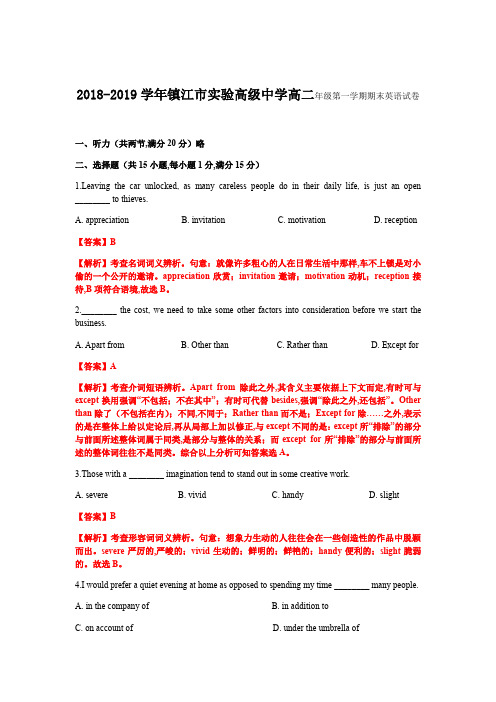
2018-2019学年镇江市实验高级中学高二年级第一学期期末英语试卷一、听力(共两节,满分20分)略二、选择题(共15小题,每小题1分,满分15分)1.Leaving the car unlocked, as many careless people do in their daily life, is just an open ________ to thieves.A. appreciationB. invitationC. motivationD. reception 【答案】B【解析】考查名词词义辨析。
句意:就像许多粗心的人在日常生活中那样,车不上锁是对小偷的一个公开的邀请。
appreciation欣赏;invitation邀请;motivation动机;reception接待,B项符合语境,故选B。
2.________ the cost, we need to take some other factors into consideration before we start the business.A. Apart fromB. Other thanC. Rather thanD. Except for 【答案】A【解析】考查介词短语辨析。
Apart from除此之外,其含义主要依据上下文而定,有时可与except换用强调“不包括;不在其中”;有时可代替besides,强调“除此之外,还包括”。
Other than除了(不包括在内);不同,不同于;Rather than而不是;Except for除……之外,表示的是在整体上给以定论后,再从局部上加以修正,与except不同的是:except所“排除”的部分与前面所述整体词属于同类,是部分与整体的关系;而except for所“排除”的部分与前面所述的整体词往往不是同类。
综合以上分析可知答案选A。
3.Those with a ________ imagination tend to stand out in some creative work.A. severeB. vividC. handyD. slight【答案】B【解析】考查形容词词义辨析。
- 1、下载文档前请自行甄别文档内容的完整性,平台不提供额外的编辑、内容补充、找答案等附加服务。
- 2、"仅部分预览"的文档,不可在线预览部分如存在完整性等问题,可反馈申请退款(可完整预览的文档不适用该条件!)。
- 3、如文档侵犯您的权益,请联系客服反馈,我们会尽快为您处理(人工客服工作时间:9:00-18:30)。
2018年镇江市高中英语优质课评比已经圆满结束,现将比赛结果公示如下:
一等奖
姓 名
学校
夏春来
江苏省句容高级中学
陈虹秀
江苏省扬中高级中学
宋晓玲
江苏省大港中学
杨 瑶
江苏省镇江第一中学
刘玉娟
江苏省丹阳高级中学
二等奖
中学
朱 丹
江苏省大港中学
魏文娟
江苏省镇江中学
沈 悦
句容碧桂园学校
朱亚萍
丹阳市吕叔湘中学
获得前两名的教师将代表镇江市参加江苏省高中英语优质课评比。
公示时间为2018年6月19日—2018年6月26日。
对获奖情况如有异议,可通过来信、来电、来访等形式向我室反映(联系电话:85382956)。
镇江市教育科学研究中心
2018年6月19日
